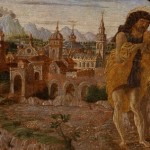 Revelation 18:11-24
Revelation 18:11-24
God’s judgment is just and true and knows no partiality.
For this, we are to sing with heaven!
It might not seem as if Revelation 18 gives us much to sing about – but it does, because it reveals a just and holy God and therefore one who can also be trusted and who is also merciful.
Because God is holy and just, even the nation chosen of the Lord, Israel, was not exempt from the Lord’s judgments when she had committed too many fornications with the nations. This was, in fact, the temptation of Israel from the beginning. From the day that Israel entered the Promised Land, her temptation was to follow the foreign nations and commit adultery with them by following their gods and cultures instead of following the true God and keeping His commandments.
But the Israel of the 1st century A.D. committed the worst form of betrayal and adultery of all: they murdered the King of Glory Himself. The Babylon of Revelation is not Babylon itself and not even Rome but Jerusalem and, by extension, Israel. The Great City of Revelation 11 is Jerusalem, and not Rome or some other great city. It was Jerusalem where our Lord was crucified (11:8) – this is one of the clearest statements in the book of Revelation, so we must use it to guide other, less certain interpretations.
She, Jerusalem, is the woman drunk with the blood of the saints and with the blood of the martyrs of Jesus: it was in Jerusalem that the first martyr was martyred (17:6), and not by Romans but by the Jews. It was Jerusalem who killed the prophets and stoned those that were sent to her, and on Jerusalem came all the righteous blood shed on the earth from the blood of righteous Abel to the blood of Zechariah, whom the Jews murdered between the temple and the altar. Because of these things, the house of Israel has been left desolate. This is the teaching of Jesus Himself in Matthew 23:34-38. When St. John writes that in the great city (Jerusalem, according to Revelation 11:8) was found the blood of the prophets and saints, of all who were slain on the earth, he is merely repeating what He heard from His Master while He walked the earth: “that on you may come all the righteous blood on the earth” because you have killed the prophets and the ones sent (apostle = “sent one”) to you (Matthew 23:34-37). “Rejoice over her, O heaven, and you holy apostles and prophets, for God has avenged you on her!” (18:21).
The woman is not alone, however: Jerusalem sat on the Roman beast with seven heads and ten horns and who had kings on the throne at the time St. John wrote the Revelation (17:10.) Ultimately, however, the Roman beast hated the Jewish harlot and made her desolate, as Jesus predicted (Matthew 23), and naked, and ate her flesh and burned her with fire.
This is the Jerusalem that had spiritually become Sodom and Egypt (Revelation 11:8), and which would be made desolate like Sodom and which had become a place of bondage like Egypt. St. Paul writes that the Jerusalem which now is (at the time of his writing) is in bondage with her children and, in fact, gives birth to bondage. With St. John, St. Paul saw that the Old Covenant could only give birth to bondage. But the Jerusalem above, the heavenly Jerusalem which is the Church (Hebrews 12:22-24) is alive. As a result, the light of the lamp (which once shone in Israel, but never in Rome or other Babylons) shall not shine in her anymore (Revelation 18:23). It is the Old Covenant, the Covenant and Land of bondage that God’s people must now flee, for like Adam before them, Israel had made God’s Promised Land into a place of bondage, an Egypt. Like Egypt before her, the plagues of judgment came upon Israel, as the Old Covenant was destroyed so that the New could be born.
Why is all of this of any significance to us? How could it cause us to sing? There are two reasons.
First, as I’ve said before, the book of Revelation is a book about the revelation of Jesus Christ, particularly as He comes to us in the New Covenant, which violently destroyed the Old Covenant that could only give bondage. The reason we can sing with the inhabitants of the book of Revelation, which are the inhabitants of heaven, is because we have the same victorious Lord and the same New Covenant and same new life to celebrate. When Revelation is taken exclusively from the realm of the future (or the past, for that matter) it becomes alive to us and provides us with the most glorious reasons for singing and joy, precisely because it reveals Jesus Christ in His holiness, His justice, His righteousness, His kingdom, His power, and His glory.
The second reason our understanding of this passage is important is because it is also a warning about our lives with Jesus Christ and the promise of God’s forgiveness to the penitent. John Keble was fond of saying that what was true for the nation of Israel as a whole is now true for individual Christians. While the Church is indefectible, that is, Jesus Christ will never have to divorce her as He did Israel, individual Christians may still commit spiritual fornication as did Israel.
It is a terrible thing to fall into the hands of a living fire, if you have not first submitted yourself to the Holy Fire to be purged and cleansed. It’s no coincidence that the two books that most clearly describe the coming of the New Covenant, Hebrews and Revelation, are also the two books most filled with numerous, loud, and urgent warnings not to apostasize, or turn from the Lord. And so we must pass through the purging fire of trial before we can sing.
But we must end Revelation 18 not with a warning but with a song, for even, especially, Heaven rejoices in the destruction of the Old, inferior, Covenant and the birth of the New and living Covenant (18:20). Here is Heaven’s song from Revelation 16:
You are righteous, O Lord,
The One who is and who was and who is to be,
Because You have judged these things.
For they have shed the blood of saints and prophets,
And you have given them blood to drink.
For it is their just due.
With St. Paul, I sing, not so much because Israel has fallen, but because her fall is riches for the world and her failure riches for the Gentiles (Romans 11:12). I sing because I worship a holy, righteous, and just God, and I sing because of the One who can make those who fall stand again, even those who, like St. Paul, persecuted him and killed His holy witnesses. I sing because I know that all of the terrible judgments of Revelation are rightly mine and that it is only the Blood of Righteous Jesus, the Blood of the New Covenant, which has covered my sins.
By the wrath of God I measure the awful nature of my own sins and the awful punishment that should have been mine. By the wrath of God I measure the love of God who has gained the victory over my sins and my death and my Hell and has opened the kingdom of heaven to one who by nature is no better than the City of Harlotry.
This is why I sing, even in times of God’s judgment.
Prayer: Father, I give thanks to You today because You are a holy God, with whom no sin can dwell. I praise You because You are just and the Righteous Judge, to whom I entrust my immortal soul. I thank You because all of my sins have been purged by the Blood of the Lamb and all of the judgment I deserved has been taken away. By Your power and for Your glory, may I remember to live in Your kingdom today by fleeing all that would lead me away from You. Amen.
Point for Meditation: What enemies in your life has the Lord defeated or is He in the process of defeating? Sing a song of thanksgiving for the victories that Christ has won in your life.
Resolution: I resolve to sing at least one song today about the glories of the New Covenant. It could be a song about the holiness, righteousness, or the victory of Jesus, for example.
© 2015 Fr. Charles Erlandson











